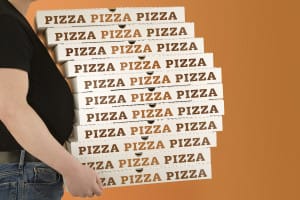It’s not unusual for substance abuse and eating disorders to co-occur, but what happens when someone develops an eating disorder while in recovery for addiction? There are some important similarities between substance use disorders and eating disorders. Sometimes it happens that a person in recovery develops a substitute addiction, and if that substitute is binge eating, anorexia or another eating disorder, the consequences can be serious.
Connection Between Addiction, Disordered Eating
Experts say that almost half of all people with an eating disorder abuse drugs or alcohol. Some even suggest there is evidence that eating disorders are a type of addiction, a behavioral addiction. Similarities in what happens in the brains of people with eating disorders and with drug addictions support this idea. Like a drug addict, someone with an eating disorder gets more and more out of control with the behavior. She can no longer stop the bad behavior, in spite of the negative consequences, just like an addict.
Eating Disorders as Substitute Addiction
When a drug or alcohol addict goes to rehab and gets treatment, she is given a new lease on life. She isn’t cured of her addiction, though. The recovering addict still has a lot of work to do to avoid sliding back and relapsing. Recovering addicts are encouraged to keep busy and to find new activities to help distract them from urge to use again. In some cases, these alternative activities can become obsessive and transition into substitute addictions. When an addict in recovery starts to obsess over food, weight or exercise, she may be at risk for developing an eating disorder as a substitute addiction. If you care about someone in recovery and you are worried that she may be heading down this path, intervention is important. But how do you know? Here are some important signs of eating disorders:
- Obsessing over weight and eating.
- Irrational fear of gaining weight.
- A self-image that is distorted and that impacts self-esteem.
- Not eating enough.
- Losing too much weight.
- Binging on food and feeling shamed or guilty later.
- Purging after a binge by vomiting, using a laxative, fasting or exercising.
Different types of eating disorders come with different symptoms, and only an expert can make a diagnosis, but if you see any signs that your loved one is becoming obsessed with food, diet and weight, you should be concerned. Do whatever you can to get her to see a specialist for diagnosis and treatment.
Treating a Recovering Addict for an Eating Disorder
When your loved one does agree to get help, make sure that the professionals understand her history with addiction. This plays an important role in how she will be treated. For instance, her doctor or addiction counselor may suggest that she go back to rehab. Developing a substitute addiction is serious and may mean that she needs more treatment. Try to help her see this not as a failure, but as a relapse of her chronic illness. If she has not yet developed enough criteria for a diagnosis of an eating disorder, outpatient counseling may be enough to help her get firmly back into recovery. Working with a nutritionist can help her learn how to eat well and how to balance food, exercise and a healthy weight. Coping with substitute addictions or eating disorders in recovery is tough, but it happens to many people. Be there for your loved one and support her.

